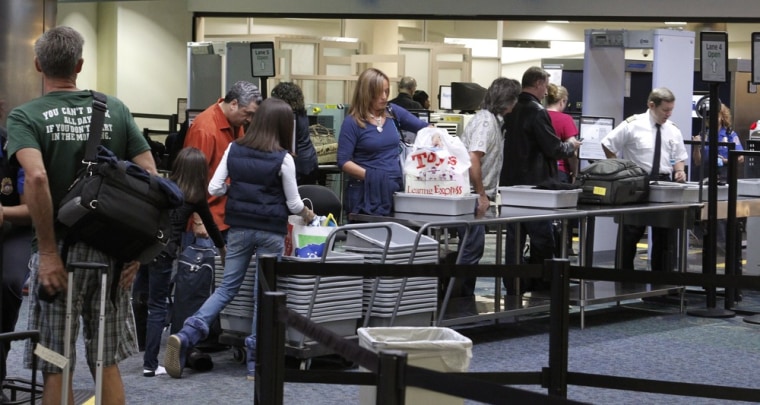The price of checking a suitcase on an airplane — $15 to $40 a bag — has added up to more than $6 billion in revenue for airlines in the United States in the last four years, according to Transportation Department statistics. The fees have also led to an increased number of bags being carried onto airplanes.
Now, the rising number of carry-on bags — the Transportation Security Administration estimated that there were 59 million more carry-ons in 2010 than the year before — has touched off a debate about just how much it costs to screen all the added bags, who should pick up the bill and whether airport security is being stretched too thin.
A report by the U.S. Travel Association, a travel industry trade group, concludes that security screeners cannot keep up with the deluge and contends that the repercussions range from the serious — diminished security — to the unpleasant — longer lines at the checkpoint.
“It’s just common sense, the more traffic coming through the same system, the less people are able to focus on each specific piece,” said Geoff Freeman, executive vice president of the association. “You have the same number of machines and 50 percent greater traffic coming through them.”
Carry-ons affect wait times, not security
A spokesman for the T.S.A., Greg Soule, acknowledged that the huge increase in the number of bags that needed to be screened had not been matched with more agents or X-ray machines, but added that the quality of inspections had not suffered.
“The number of bags brought to the checkpoint may affect passenger wait times,” he said, “but not the level of security that we provide, which is our priority.”
At a hearing of a Senate subcommittee on homeland security this month, Senator Mary Landrieu, Democrat of Louisiana, asked the homeland security secretary, Janet Napolitano, whether lawmakers should “be looking at the airlines” to recoup some of the profits from bag fees to pay for additional security.
Ms. Napolitano estimated that adding more security staff would cost a quarter of a billion dollars a year, though she did not say whether the airlines should be asked to help pay for it. Mr. Soule said later that it would be inappropriate to comment since bag fees were not regulated by the T.S.A.
Victoria Day, a spokeswoman for the Air Transport Association, a trade group representing the airlines, said it was “in regular discussions with lawmakers” on these issues.
The Department of Homeland Security has proposed an increase to $4, from $2.50, in the passenger security fee, beginning in 2012. An increase in the fee, which passengers pay each time they board a plane, would raise $600 million a year, the department estimated.
“Despite Congress’s original intent that the security fee cover nearly all costs related to passenger and property screening, the fee currently offsets less than a third of the total,” Mr. Soule said.
Fees become the golden goose
Airlines first started charging for checked bags in 2005, and since then, the charges have become the largest source of flight-related ancillary revenue for the carriers. Only two major airlines, JetBlue and Southwest, still allow free checked bags, and security screeners in their terminals have not reported an increase in carry-on baggage.
The U.S. Travel Association recommended that the Transportation Department follow the example of Southwest and JetBlue and require airlines to include one checked bag in the base ticket price. It also suggested that the department enforce the number and size of bags that passengers could carry on the plane.
Airlines call the proposals regressive. The Airline Transport Association said government involvement in airline pricing “diminishes customer choice and competitive differentiation among carriers.”
This new discussion of bag fees comes after months of passenger complaints that new security practices are too intrusive and security checks take too long.
Passengers are also grumbling about having to pay for what used to be included in the price of the ticket — not just bags, but also food and drinks, bulkhead seats and even the order of passenger boarding. Airlines defend the fees, called “fare unbundling,” saying passengers can save money on travel when they do not have to pay for things they do not need.
'Airlines have to make money'
The U.S. Travel Association claims that the frustrations of flying have caused some people to avoid travel by air. In 2007 and 2008, 28 percent of travelers said they were dissatisfied enough to avoid at least one airplane trip, according to a survey cited in the report.
But Robert Herbst, a retired airline captain who writes the blog airlinefinancials.com, said many factors in air travel today were different from 2008, when the survey was conducted. “Fuel was up to $147 a barrel, there were the highest airfares in history, a lot of stuff was going on so that people didn’t want to fly,” he said.
Mr. Herbst said most airlines continue to fly with full airplanes. “Last year, there were record high load factors. If there is that much discouragement about going through the screening process, how come we’ve got load factors so high?”
George Hobica, who tracks airline baggage fees for the Web site he created, airfarewatchdog.com, said eliminating the charge for the first checked bag might not solve the problem. “Airlines have to make money, and when they raise fares, people stay home.”
After six years of charging for checked bags, airlines have found a steady and consistently increasing source of revenue. They have not yet figured out how to make it clear to customers that bringing a suitcase on the airplane may be an individual choice, but that all passengers deal with the consequences, Mr. Freeman of the U.S. Travel Association said.
“We all act according to incentives,” he said. “The incentives in place today encourage passengers to overwhelm the system.”
This story, , originally appeared in the New York Times.
